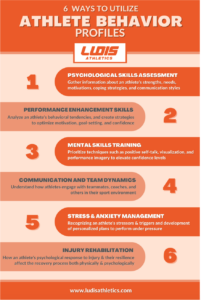
The Key To Understanding Athletes and Team Dynamics
By Brian Alexander, CMPC
The Key To Understanding Athletes and Team Dynamics. As a certified mental performance consultant, I frequently encounter the stories of young competitive athletes and their experiences in sports. Often, their narratives revolve around the common refrain, “Everything seems to be going fine, BUT my coach doesn’t play me enough, and my teammates don’t always show the same level of dedication.”
While there may be truth to their perceptions, the reality is that clear and consistent communication is not always achieved among team members. Consequently, young athletes striving for success can easily lose sight of the balanced fulfillment that comes from the developmental aspect of sports.
The Importance of Behavioral Profiles
It is crucial to recognize that sports involve people: they are played by people, coached by people, and consumed by people. Thus, getting the human element right is paramount in sports.
Sports psychologists and mental performance consultants utilize behavioral profiles as valuable tools to gain deeper insights into athletes’ preferred behaviors and tendencies, both in comfort and under the pressures of sport-related stress.
These profiles provide invaluable information that can aid in adjusting training programs and supporting athletes in optimizing their performance.
How to Utilize Behavioral Profiles
Behavioral profiles provide valuable insights into athletes’ psychological tendencies, enabling sports professionals to optimize performance and foster effective team dynamics.
For example, as a certified mental performance consultant, when working with a team and coaching staff who have completed their behavioral profile assessment, we can communicate with each member using a common language about why they make decisions a certain way on plays and also how others can effectively communicate with them to help them make changes in their decisions and adapt the way they play more cohesively.
By understanding athletes’ strengths, needs, and communication styles, coaches, sports psychologists, and mental performance consultants can utilize tailored interventions to enhance performance, improve communication, manage stress, and promote team cohesion.
Here are six key ways to effectively utilize behavioral profiles in sports.
1. Psychological Skills Assessment
Behavioral profile tools are utilized to gather information about an athlete’s emotional and psychological strengths, needs, motivations, coping strategies, and communication styles.
This assessment helps identify strengths and areas for improvement, providing valuable insights for enhancing an athlete’s performance and overall development.
2. Performance Enhancement Skills
Behavioral profiles assist in designing interventions to enhance performance. By analyzing an athlete’s behavioral tendencies, strategies can be identified to optimize motivation, goal-setting, concentration, and confidence.
For instance, if an athlete tends to overthink during competition, developing action-focused self-talk cues or communication strategies can be employed to shift attention externally and focus on the task at hand.
3. Mental Skills Training
Behavioral profiles play a crucial role in developing customized mental skills training programs.
For example, if an athlete exhibits low self-confidence, the program can prioritize techniques like positive self-talk, visualization, and performance imagery to elevate their confidence levels.
By leveraging behavioral insights, athletes can enhance their mental skills and unlock their full potential in sports.
4. Communication and Team Dynamics
Behavioral profiles are valuable in understanding how athletes engage with teammates, coaches, and others in their sports environment.
By identifying communication styles, leadership qualities, and interpersonal strengths and weaknesses, we can effectively communicate with coaches and teammates. This understanding fosters cohesive team dynamics, facilitates conflict resolution, and promotes leadership development within the sports team.
Leveraging behavioral insights enhances communication and strengthens relationships, leading to a more harmonious and successful team.
5. Stress and Anxiety Management
Behavioral profiles are instrumental in identifying an athlete’s response to stress and anxiety. By recognizing an athlete’s stressors and triggers, whether within their sport or influenced by external circumstances, we can explore the specifics further.
This information enables the development of personalized stress management plans and interventions, ensuring that athletes can maintain optimal performance under pressure.
Behavioral insights empower athletes to effectively manage stress and anxiety, promoting resilience and enhancing their ability to perform at their best.
6. Injury Rehabilitation
Behavioral profiles hold significant value in the context of injury rehabilitation. They provide insights into an athlete’s psychological response to injury, their resilience, and potential challenges they may face in adhering to the recovery plan.
Understanding an athlete’s behavioral patterns allows them to actively facilitate the recovery process and leverage mental skills to increase the likelihood of a complete return to play, both physically and psychologically.
By incorporating behavioral insights, athletes can optimize their rehabilitation journey and enhance their overall recovery outcomes.
Comprehensive Approach
It is important to recognize that behavioral profiles are an integral part of a comprehensive approach in sports psychology. In addition to behavioral profiles, considering environmental factors, contextual influences, and individualized athlete goals is crucial for providing holistic support and enhancing performance and well-being.
Collaborating with a Certified Mental Performance Consultant as part of an athletic performance multidisciplinary team is a significant step towards fostering self-awareness and empowering young athletes to seek the necessary feedback for developing high-performance behaviors.
A professional hired by a parent or coach will collaborate on a debrief plan with the athlete, coach, and/or team that customizes the results of each person’s behavioral profile pattern and aligns the results with actionable sport-specific behaviors that can be trained over time.
By taking this comprehensive approach, athletes can unlock their full potential and thrive in their athletic pursuits.
Brian Alexander is a Certified Mental Performance Consultant at Ludis Athletics. To learn more about our team of specialists, please visit www.ludisathletics.com. Our CMPC, Doctor of Physical Therapy, and Registered Dietitian are ready to support you on your athletic journey. With personalized training, injury prevention, and fueling strategies, Ludis Athletics aims to optimize both your mind and body. Join us at www.ludisathletics.com and take the first step towards peak performance. Let’s fuel your success together!
More great articles like this one:
9 Habits of Highly Effective Team Players
How To Create The Right Mindset For Kids
How I Changed My Team Culture With One Simple Phrase













